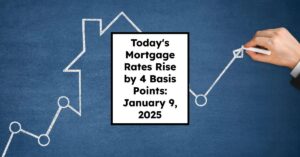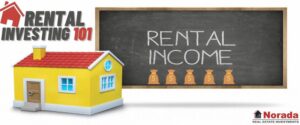Mortgage rates are a critical factor when buying a home and can significantly impact your overall financial health. As of January 10, 2025, the mortgage rates have seen a modest increase, with the average 30-year fixed mortgage rate at 6.93% and the 15-year fixed rate at 6.14%. This marks a rise of 27 basis points compared to last year, making it essential for potential homebuyers and those looking to refinance to stay informed about these changes.
Mortgage Rates Today Are Up: January 10, 2025 Insights
Key Takeaways
- Current Rates: 30-year fixed at 6.93% and 15-year fixed at 6.14%.
- Yearly Increase: Rates are 27 basis points higher than the same week last year.
- Recent Trends: Rates are edging closer to 7%, the highest seen in recent times.
- Economic Factors: Influences include inflation data and Federal Reserve policies.
- Refinancing: Current refinance rates are slightly lower than purchase rates, presenting opportunities for borrowers to explore options.
It’s crucial to grasp what mortgage rates entail. Simply put, the mortgage rate is the amount of interest a lender charges you to borrow money for a home loan. Rates can fluctuate based on various economic factors, including inflation, employment rates, and even political events, which can affect investor confidence and mortgage costs.
Current Mortgage Rates Overview
According to the latest data from Zillow and Freddie Mac, here are the current mortgage rates:
| Loan Type | Current Rate |
|---|---|
| 30-Year Fixed | 6.93% |
| 20-Year Fixed | 6.48% |
| 15-Year Fixed | 6.14% |
| 5/1 Adjustable Rate Mortgage (ARM) | 6.72% |
| 7/1 ARM | 6.71% |
| 30-Year VA | 6.18% |
| 15-Year VA | 5.65% |
| 5/1 VA | 6.20% |
These rates represent national averages and are rounded to the nearest hundredth.
Current Refinance Rates
Refinancing is also an option that many homeowners consider, especially in the current economic environment. The rates for refinancing are as follows:
| Refinance Type | Current Rate |
|---|---|
| 30-Year Fixed | 6.78% |
| 20-Year Fixed | 6.64% |
| 15-Year Fixed | 6.07% |
| 5/1 ARM | 6.81% |
| 7/1 ARM | 6.67% |
| 30-Year VA | 6.13% |
| 15-Year VA | 5.78% |
| 5/1 VA | 5.90% |
Again, these numbers are average national figures.
Recent Trends in Mortgage Rates
Mortgage rates have recently risen for several reasons, indicating an upward trend that potential homeowners should consider. According to reports, the average 30-year mortgage rate has jumped, reflecting broader economic patterns. These increases come as new data revealed persistent inflation and job openings higher than expected, complicating the anticipation of Federal Reserve rate cuts.
This week marks the fourth consecutive week of rising mortgage rates, with the 30-year fixed rate inching near the 7% mark. This upward pressure has been attributed to the robust performance of key economic sectors that are affecting cost expectations as articulated by Sam Khater from Freddie Mac. The rising costs have also played a role in diminishing affordability within the housing market, making it an important consideration for buyers.
Why Are Mortgage Rates Increasing?
Several factors contribute to the increase in mortgage rates today:
- Inflation: Rising inflation rates can lead to increased mortgage rates as lenders seek to maintain their profit margins. When prices rise, the cost of borrowing also goes up, reflecting the increased risk to lenders.
- Federal Reserve Policies: The Federal Reserve's decisions, particularly regarding the federal funds rate, can have a ripple effect on mortgage rates. Economists do not expect any cuts to the federal funds rate in the near future, keeping borrowing costs high.
- Job Market Dynamics: An increase in job openings and stronger-than-expected payrolls signify a robust economy, which can drive rates higher. With more jobs available, consumer spending often increases, leading to demand for borrowing and potentially pushing rates up further.
- Political Climate: The uncertainty surrounding potential changes in leadership (like the impact of a second Trump term) can influence economic predictions and investor confidence. Investors may become more cautious, which may also increase the perceived risk of lending, leading to higher rates.
What to Expect Moving Forward
Despite recent hikes, some analysts predict the possibility of a gradual decline in mortgage rates throughout 2025, contingent on how the economy responds to ongoing inflation pressures and Federal Reserve policies. However, current projections indicate that it is likely rates will remain above 6% for the foreseeable future.
Short-term Projections and Long-term Outlook
While predictions can vary among economists, the consensus is that while rates may not drop significantly in the immediate future, they may stabilize or decrease slightly as the economy adjusts. For example, if inflation cools down in response to the Federal Reserve's monetary policy, there could be less pressure on rates.
The housing market will also play a significant role in shaping the future of mortgage rates. If home prices continue to rise due to a lack of inventory, the impact of rates on buyers will intensify. Conversely, an increase in housing supply could help alleviate some of the upward pressure on prices, potentially allowing mortgage rates to stabilize.
Impact on Buyers and Homeowners
For homebuyers, understanding the implications of these rates is vital. Higher mortgage rates mean higher monthly payments and can ultimately influence your purchasing power. Additionally, this could tighten the market as potential buyers pause to assess their financial situations.
Example Calculation: Let’s consider a homeowner looking to buy a home for $350,000 with a 30-year fixed mortgage:
- At a rate of 6.93%, the monthly payment would be roughly $2,292 (excluding taxes and insurance).
- A year ago, at a rate of 6.66%, the payment would have been $2,258.
The increase of just over $34 in monthly payments may not seem large, but over the life of a 30-year mortgage, that adds up to more than $12,000 in extra costs. Therefore, as rates inch higher, many may need to reevaluate their budgets.
Regional Variations in Mortgage Rates
While national averages are a good starting point, it's also crucial to consider that mortgage rates can vary significantly by region. Factors such as local economic conditions, the average cost of homes, and demand in specific markets can all lead to differences in rates. For instance, urban areas with high demand may see rates that diverge from the national average, while rural areas might have rates that are lower due to less competition for loans.
Recommended Read:
Mortgage Rate Predictions January 2025: Forecast for Homebuyers
Mortgage Rates Rise to the Highest Level Since July Last Year
The Refinance Option
The refinance rates today offer a slight respite compared to purchasing rates. Homeowners may find it beneficial to explore refinancing to secure lower rates available, especially if they are currently locked into higher rates.
Refinance Calculation Example: Suppose you refinanced your loan of $250,000 at a rate of 6.07% (15-year fixed rate):
- Your monthly payment would be about $2,106, compared to about $2,063 at 6.93%. This small difference could make a significant difference in total interest paid over the life of the loan.
Why Consider Refinancing?
- Lower Monthly Payments: If current rates are lower than those of your original loan, refinancing can reduce your monthly payments significantly.
- Access to Cash: Homeowners can also consider a cash-out refinance to access the equity in their homes. This can be a great option for those needing funds for renovations or debt consolidation.
- Shorter Loan Terms: For some, refinancing to a shorter loan term can save thousands in interest over the life of the loan, even if the monthly payment increases.
- Adjustable Rate Mortgages: Homeowners with adjustable-rate mortgages (ARMs) might consider refinancing into a fixed-rate mortgage to avoid the uncertainty of future rate hikes.
Exploring Different Mortgage Products
When looking into mortgage options, it’s important to understand the variety of loan types available in the market. Besides the traditional fixed-rate and adjustable-rate mortgages, there are several other loan programs to consider:
- VA Loans: Available for veterans and active military members, these loans typically offer lower interest rates and do not require private mortgage insurance (PMI).
- FHA Loans: These loans are backed by the Federal Housing Administration and are ideal for first-time homebuyers or those with less-than-perfect credit. They allow for lower down payments and have more flexible qualifying criteria.
- USDA Loans: For those looking to purchase in rural areas, USDA loans can provide favorable terms, including 0% down payment options for eligible applicants.
Understanding the difference between these products can help borrowers make informed decisions based on their personal circumstances and financial goals.
Financing Strategies in a High Rate Environment
In light of the current mortgage rate environment, potential homebuyers should consider employing specific financing strategies to position themselves favorably:
- Rate Locks: If you find a rate that seems favorable, locking in that rate can help protect you against future increases while you shop for homes.
- Shop Around: Different lenders may offer varying rates. It’s beneficial to compare offers from multiple financial institutions to ensure you receive the best possible terms.
- Consider Smaller Lenders: Sometimes, smaller or local lenders may offer more competitive rates compared to larger banks, as they might have less overhead.
- Work with a Mortgage Broker: Brokers can provide insights into different lenders and help you find the best rates available based on your financial profile.
Conclusion
Staying informed about mortgage rates is essential for anyone looking to purchase or refinance a home. The recent increase in rates signifies the importance of careful financial planning and consideration of current economic indicators. While the sentiments suggest a potential decline in rates, the reality of today’s financial landscape prompts both buyers and homeowners to act judiciously.
As economic conditions change, the key to navigating the housing market effectively lies in understanding these rates and leveraging them to your advantage.
Work with Norada in 2025, Your Trusted Source for
Real Estate Investing
With mortgage rates fluctuating, investing in turnkey real estate
can help you secure consistent returns.
Expand your portfolio confidently, even in a shifting interest rate environment.
Speak with our expert investment counselors (No Obligation):
(800) 611-3060
Recommended Read:
- NAR Predicts 6% Mortgage Rates in 2025 Will Boost Housing Market
- Mortgage Rates Predictions for 2025: Expert Forecast
- Half of Recent Home Buyers Got Mortgage Rates Below 5%
- Mortgage Rates Need to Drop by 2% Before Buying Spree Begins
- Will Mortgage Rates Ever Be 3% Again: Future Outlook
- Mortgage Rates Predictions for Next 2 Years
- Mortgage Rate Predictions for Next 5 Years
- Mortgage Rate Predictions for 2025: Expert Forecast
- Prediction: Interest Rates Falling Below 6% Will Explode the Housing Market
- Mortgage Rate Predictions: Why 2% and 3% Rates are Out of Reach
- How Lower Mortgage Rates Can Save You Thousands?
- How to Get a Low Mortgage Interest Rate?
- Will Mortgage Rates Ever Be 4% Again?









